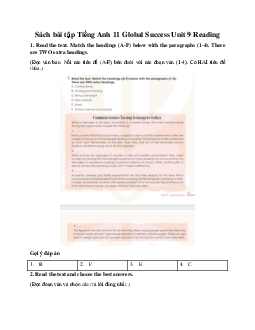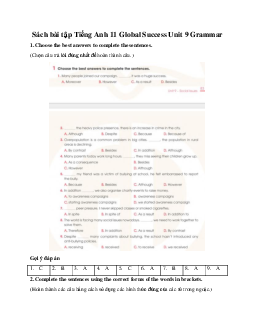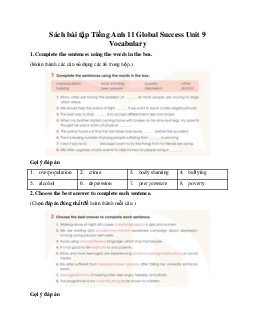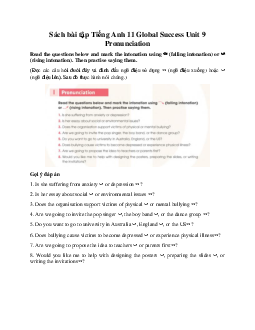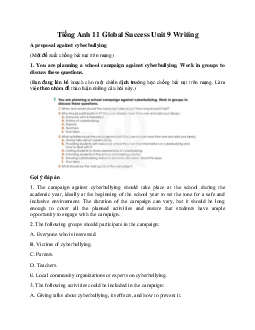





Preview text:
Trắc nghiệm tiếng Anh 11 Unit 9
Câu 1; Choose the best answer A, B, C or D to complete the sentences.
1. __________ we got lost driving into the city, we were late for the meeting. A. Since B. Because of C. However D. For
2. Two of the factories in our small town have closed. __________, unemployment is high. A. However B. Because C. So that D. Furthermore
3. John’s favourite show was on. He reach to turned on the TV __________ he could watch it. A. because of B. therefore C. so that D. for
4. She bought the book __________ she had heard it was good. A. due to B. because C. because of D. so
5. __________ I heard the telephone ring, I didn’t answer it. A. Because B. Only if C. Even though D. If
6. __________ the post office was closed, I couldn’t mail my package. A. Therefore B. Because of C. However D. Since
7. __________ I was dead tired, I walked all the way home. A. Despite B. Although C. In spite of D. Because
8. Some English words have the same pronunciation __________ they are
spelled differently, for example, dear and deer. A. unless B. even though C. since D. only if
9. Ms. Moore, the school counselor, had years of experience dealing with
student problems. __________, she is sometimes confronted by a problem that she cannot handle by herself. A. Therefore B. However C. Otherwise D. On the other hand
10. __________ excellent art museums, Moscow has a world-famous ballet company. A. Because of B. In spite of C. Moreover D. In addition to
Câu 2. Read the text, and then do the tasks that follow. Peer Pressure
Mary is walking to her maths lesson. She has got a test, but she feels all right.
Suddenly, Dan, the coolest boy in the class, speaks to her, “Come on!” he says.
“Forget maths. Let’s go into town!” Now Mary feels bad. She has to make a
difficult decision. Should she go to maths because that is the right thing to do,
or should she take the chance to be friends with the most popular person in the class?
If you have had an experience like this, don’t worry. It is called peer pressure
and it happens to everybody. However, people have different reactions.
Confident people refuse to do things they
don’t want to do, but shy and anxious people often give in. It may be because
they want to be liked. It may be because they worry that their friends will make
fun of them, or perhaps they are just curious about trying something new.
Whatever the reason, some people end up doing things they really don’t want to do.
It is hard being the only one who says ‘no’, and the question is - how do you do
it? Firstly, you must decide what you believe in. If you think that missing
maths, or smoking, or going somewhere you know your parents wouldn’t like
is a bad idea then the answer is simple. Don’t do it. It is your decision, not
anybody else’s. You don’t need to shout and scream, but you must be confident
and you must be firm. You need to say, “No, thanks. I don’t want to do that.”
Of course, being on your own against everybody else is very hard, so it can
really help to have at least one other peer, or friend, who will say ‘no’ too.
Choose your friends carefully. You want friends to support you when you are
in trouble. You don’t want people who will always agree with the majority.
Remember, the most popular people aren’t always the most trustworthy.
However, peer pressure is not completely negative. You can learn a lot from
people of your own age. They can teach you great football skills or the best
way to do your maths homework. And don’t forget you can tell them things too
and that always feels great. So, find friends who have similar interests. And
remember, friendship isn’t about feeling depressed. It is about sharing experiences and having fun.
Task 1. Decide whether the statements are true (T) or false (F).
1. Peer pressure means feeling you have to do something because your friends do it. _____
2. Peer pressure is very common. _____
3. Peer pressure is always a bad thing. _____
Task 2. Choose the best answer.
1. What does Dan suggest doing? A. cheating in the maths test B. going in town after school C. missing a lesson D. making some new friends
2. The text describes people who give in to peer pressure as _____. A. quiet B. nervous C. popular D. funny
3. What does the word “it” in paragraph 3 refer to? A. saying ‘no’ B. asking questions C. going out with friends
D. doing things you don’t really like
4. What quality does the writer recommend in a friend? A. generosity B. popularity C. strength D. loyalty
5. The writer suggests it is a good idea to find friends _____. A. do a variety of activities
B. have things in common with you C. are very clever D. are good at sport
Câu 3: Do the quiz and then look at the key. What sort of friend are you?
1. If my friend has a problem, I _________.
A. listen to him/her and try to understand
B. go out with him/her and have some fun C. tell him/her what to do
2. If my friend thinks his/her homework is difficult, I _________.
A. try to help him/her to understand it
B. say “Don’t worry – it’s only homework”
C. tell him/her to ask the teacher for help
3. If my friend is ill, I usually A. visit him/her
B. send him/her a “get well soon” text
C. tell him/her how to get better
4. If I don’t like my friend’s clothes, I _________.
A. don’t tell him/her – it’s not important
B. say “your clothes are interesting”
C. say “I don’t like your clothes”
5. If my friend is a bit late, I _________. A. wait for him/her
B. don’t get angry because I’m always late
C. text him/her and say “Hurry up!”
6. If it’s my friend’s birthday, I usually _________. A. make something for him/her
B. choose a fun present for him/her
C. choose a useful present for him/her
Document Outline
- Trắc nghiệm tiếng Anh 11 Unit 9
